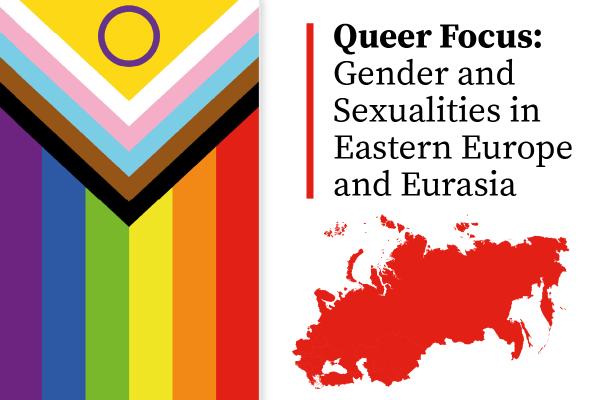
Many efforts have been made over the past several years to diversify Eastern European and Eurasian studies. This new spotlight surfaces research that has been conducted by many scholars for much longer, highlighting their commitment to telling stories and honoring perspectives of diverse and minority communities. Their work reveals that while there is no unified queer experience in the region, there is often a one-size-fits all state response to the reality of queer lives in many nations within the region. How can a queer-studies focus advance conversations about decolonization in East European and Eurasian Studies? To address this question, Queer Focus will have six virtual panels featuring speakers from various disciplines and institutions. Panelists and participants will explore how gendered regimes were constitutive of Russo-centric relationships of power, defining the region and how we study it, as we collectively grapple with what it means to re-examine our current research, teaching, and institutional practices.
Panel 2 of the series will take a historical view of queer studies within the region, with a special look at the role and availability of archives.
Speakers
Anita Kurimay, Moderator, Director, Associate Professor of History and Director of Gender and Sexuality Studies, Bryn Mawr College
Anita Kurimay specializes in modern European history with an emphasis on East-Central Europe. Her main research interests include the history of sexuality, women’s and gender history, conservativism and the politics of the far right, the history of human rights, and the history of sport. She is the author of Queer Budapest, 1873–1961.
Feruza Aripova, Visiting Scholar, Harriman Institute at Columbia University
Feruza Aripova (she/her) is a Lecturer of Modern Russian History at the Lehman College, CUNY. She is a Center Associate and a co-chair of the Gender, Socialism and post-Socialism group at the Davis Center for Russian and Eurasian Studies at Harvard University. Feruza recently completed her PhD in World History at Northeastern University. Her doctoral dissertation, titled "Fifty shades of Vice: Decolonizing the Soviet homophobic legacy," sought to explore and map the impact of colonial, legal and medical perceptions of same-sex desire on contemporary state policies and public opinion in Russia and its former Eastern and Western borderlands (Central Asian and Baltic republics).
Kamil Karczewski, Fellow, Institute of Historical Research, School of Advanced Study, University College London
Kamil Karczewski is a Past & Present Fellow at the Institute of Historical Research, University of London. His research explores the intersections of queerness, nationalism, and class in the history of interwar Central and Eastern Europe. Karczewski earned his PhD from the European University Institute in Florence. Previously, he was a fellow at the German Historical Institute in Washington, the Herder Institute for Historical Research on East Central Europe in Marburg, and the Leibniz Institute of European History in Mainz.
Irina Roldugina, UCIS Postdoctoral Fellow, University of Pittsburgh
Irina Roldugina, originally from Moscow, Russia, received her doctoral degree from the University of Oxford. She specializes in the history of sexuality and homosexuality in Imperial and Soviet Russia. Her book, "Vernacular Queer: Gender and Sexual Emancipation in the Early Soviet State," is currently in the pipeline. Her writings can be found here.
Roman Utkin, Assistant Professor of Russian, East European, and Eurasian Studies; Assistant Professor, Feminist, Gender, and Sexuality Studies, Wesleyan University
Roman Utkin is an Assistant Professor of Russian, East European and Eurasian Studies and of Feminist, Gender, and Sexuality Studies at Wesleyan University. He is a scholar of 20th-century Russian and Russophone poetry, prose, and visual culture. His recent book, Charlottengrad: Russian Culture in Weimar Berlin (University of Wisconsin Press, 2023), provides a detailed study of the wide variety of personal and political positions Russian émigré artists in Berlin took towards the Soviet Union and Weimar culture. He also recently published a thematic cluster of articles on “Illegal Queerness: Russian Culture and Society in the Age of Anti-LGBTQ Censorship” in the Russian Review.
Sponsorship
Additional financial support has been provided by:
Center for Russian, East European, and Eurasian Studies, University of Kansas
Center for Russian, East European, and Eurasian Studies, University of Michigan
Center for Slavic, Eurasian and East European Studies, UNC-Chapel Hill
Inner Asian and Uralic National Resource Center, Indiana University, Bloomington
Institute for European, Russian, and Eurasian Studies, The George Washington University
Institute of Slavic, East European, and Eurasian Studies, University of California, Berkeley
Melikian Center for Russian, Eurasian, and Eastern European Studies, Arizona State University
Robert F. Byrnes Russian and East European Institute, Indiana University, Bloomington
Accessibility
The Davis Center for Russian and Eurasian Studies at Harvard University encourages persons with disabilities to participate in its programs and activities. If you anticipate needing any type of accommodation or have questions about the physical access provided, please contact us at 617-495-4037 or daviscenter@fas.harvard.edu in advance of your participation or visit. Requests for Sign Language interpreters and/or CART providers should be made at least two weeks in advance if possible. Please note that the Davis Center will make every effort to secure services but that services are subject to availability.
